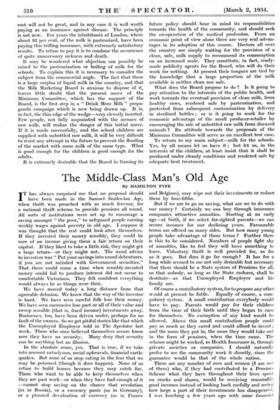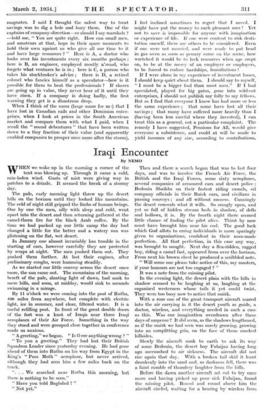The Middle-Class Man's Old Age
By HAMILTON FYFE
IT has always surprised me that no proposal should have been made in the Samuel Smiles-ian Age, when thrift was preached with so much fervour, for a national thrift scheme to provide pensions all round. All sorts of institutions were set up to encourage a saving amongst " the poor," to safeguard people earning weekly wages against poverty in old age. I suppose it was thought that the rest could look after themselves. If they invested their money sensibly, they could be sure of an income giving them a fair return on their capital. If they liked to take a little risk, they might get a large return—or they might not. The usual advice to investors was " Put your savings into sound debentures, if you are not satisfied with Government securities." That there could come a time when sensibly-invested money could fail to produce interest did not occur to comfortable Victorians. They felt confident everything would always be as things were then.
We have moved today a long distance from that agreeable delusion. We know that the way of the investor is hard. We have seen careful folk lose their money. We have seen currencies lose part or all of their value and sweep sensible (that is, fixed income) investments away. Businesses, too, have been driven under, perhaps for no fault of the owners. So we get pitiful stories like that which the Unemployed Employer told in The Spectator last week. Those who once believed themselves secure know now they have no security. Many deny that security can be anything but an illusion.
In the absolute sense, yes. That is true, if we take into account cataclysms, social upheavals, financial earth- quakes. But none of us stop eating in the fear that we may be poisoned (though it does happen). None of us refuse to build houses because they may catch fire. Those who want to be able to keep themselves when they are past work—or when they have had enough of it —cannot stop saving on the chance that revolution (as in Russia), or a currency panic (as in Germany), or a planned devaluation of currency (as in France and Belgium), may wipe out their investments or reduce them by four-fifths.
But if we are to go on saving, what are we to do with our money ? Certainly we can buy through insurance companies attractive annuities. Starting at an early age—at birth, if we select far-sighted parents—we can secure incomes for our declining years. Favourable terms are offered on many sides. But how many young people take advantage of those terms ? Further there is this to be considered. Numbers of people fight shy of annuities, like to feel they will have something to leave. Voluntary thrift is well provided for, as far as it goes. But does it go far enough ? It has for a long while seemed to me not only desirable but necessary that there should be a State system of Pensions for all, so that nobody, as long as the State endures, shall be destitute—as that Unemployed Employer and his family are.
Of course a contributory system, for to propose any other would at present be futile. Equally of course, a com- pulsory system. A small contribution everybody would have to pay. Parents would pay for their children from the time of their birth until they began to earn for themselves. No exemption of any kind would be allowed. Above this small contribution people could pay as much as they cared and could afford to invest ; and the more they put in, the more they would take out in the form of pensions, when the time came. The scheme might be worked, as Health Insurance is, through private societies or companies. I should naturally prefer to see the community work it directly, since the guarantee would be that of the whole nation.
There are any number of men and women (I am one of them) who, if they had contributed to a Pensions Scheme what they have throughout their lives spent on stocks and shares, would be receiving reasonably good incomes instead of looking back ruefully and seeing how large a part of their investments has disappeared. I was lunching a few years ago with some financial magnates. I said I thought the safest way to treat savings was to dig a hole and bury them. One of the captains of company-direction--or should I say marshals ? —told me, " You are quite right. How can small men, and amateurs, at that, hope in their spare moments to hold their own against us who give all our time to it and have large resources ? " Here is A, a doctor who looks over his investments _every six months perhaps ; here is B, an engineer, employed mostly a' road, who forgets what ventures he is in ; here is C, a parson who takes his stockbroker's advice ; there is D, a _ retired colonel who fancies himself as a speculator—how is it possible for them to beat the professionals ? If shares are going up in value, they never hear of it until they have risen. If a company is doing badly, the first warning they get is a disastrous drop.
When I think of the sums (large sums for m-) that I have lost in Canadian rails and other Dominion enter- prises, when I look at prices in the South American market and compare them with what I paid, when I recall the " sound debentures " that have been written down to a tiny fraction of their value (and apparently enabled companies to prosper once more after the storm), .I feel inclined sometimes to regret that. I saved. I might have put the money to such pleasant uses ! Yet not to save is impossible for anyone with imagination or experience of life. If one were content to risk desti- tution oneself, there are others to be considered. Even if one were not married, and were ready to put head in gas oven as soon as penury came on the scene, how wretched it would be to lack resources when age crept on, to be at the mercy of an employer or employers, to be forced to endure hardships, humiliations !
If I were alone in my experience of investment losses, I should keep quiet about them. I should say to myself, " I must be a bigger fool than most men." If I had speculated, played for big gains, gone into wild-cat enterprises, I should not publish my folly to my fellows. But as I find that everyone I know has had more or less the same experience ; that some have lost all their savings ; that many have suffered more heavily than I (having been less careful where they invested), I can treat this as a general, not a particular complaint. The remedy I have suggested, Pensions for All, would give . everyone a subsistence, and could at will be made to yield incomes of any size, according to contributions.





























































 Previous page
Previous page